
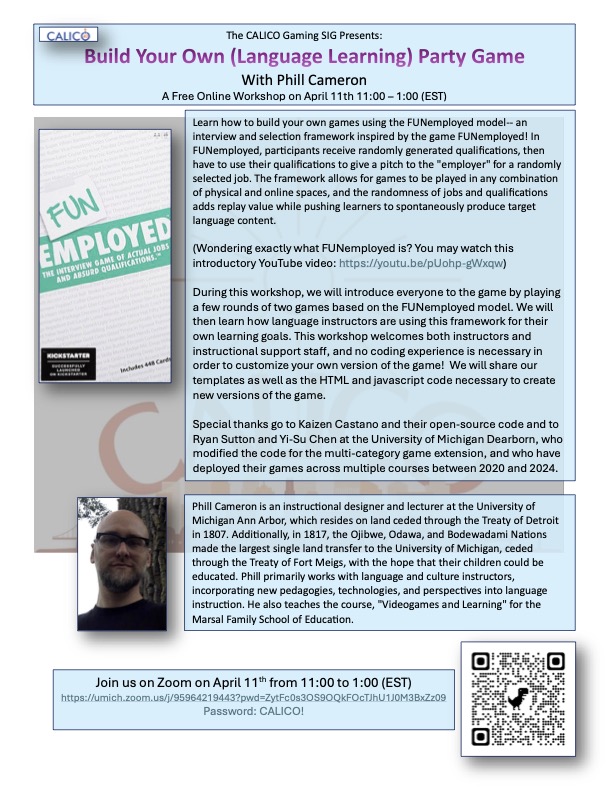


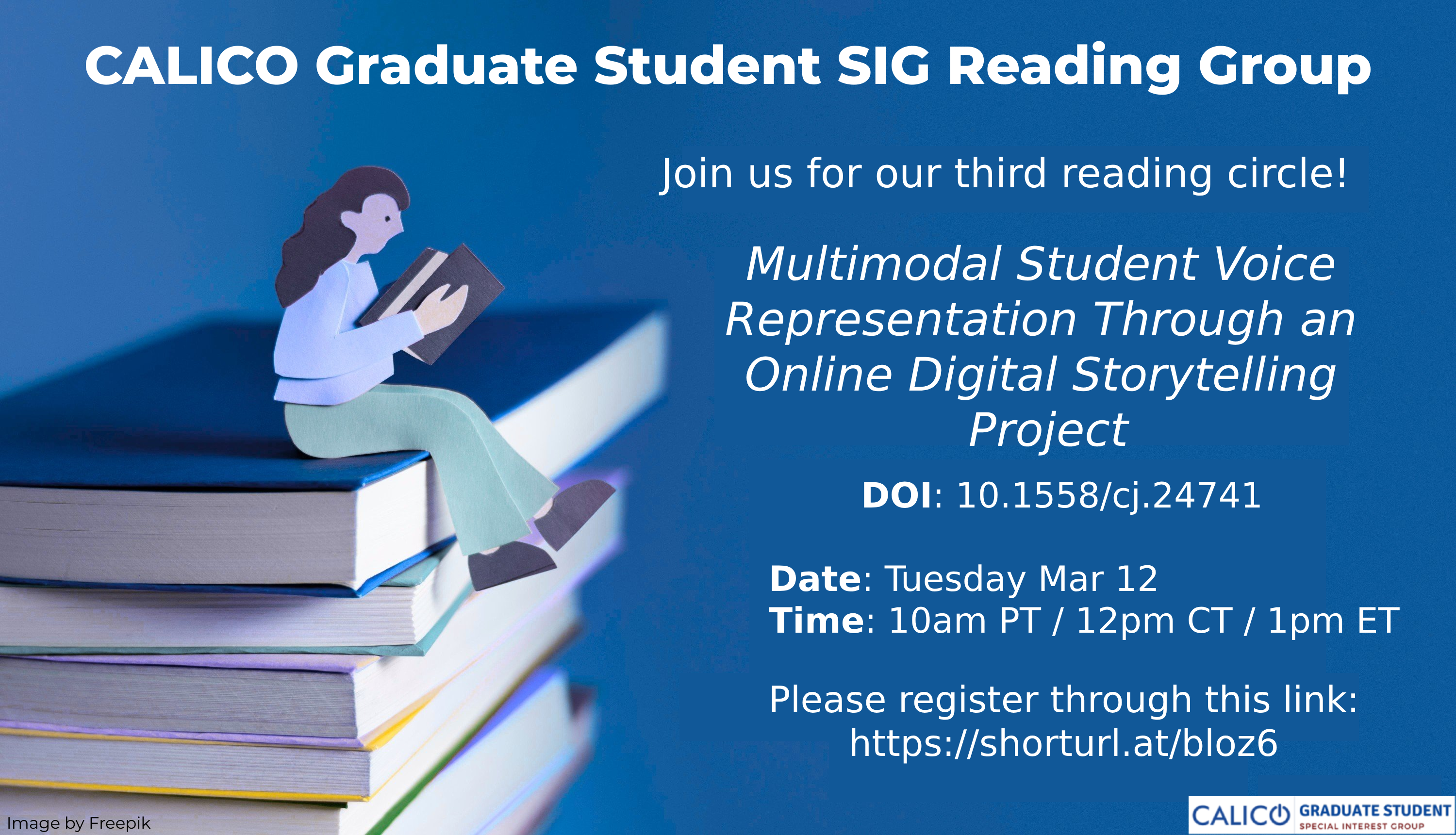
You are invited to our next reading circle! This time we are reading “Multimodal Student Voice Representation Through an Online Digital Storytelling Project”! https://doi.org/10.1558/cj.24741
📆: Tuesday, March 12th
⏰: 10am PT/12pm CT/1pm ET
📍 Please pre-register using this link: http://shorturl.at/bloz6
Please try and read the article before joining so we can all engage in a deep and fruitful discussion!
Thank you Francesca Marino, University of South Florida, and Linda Molin-Karakoc, University College London, for hosting this reading circle!
See you there!
* * * * * * * * * * ** * * * * * * * * * ** * * * * * * * * * ** * * * * * * * * * *
—
Lillian Jones, MA
PhD Candidate | Associate Instructor
Department of Spanish and Portuguese
University of California, Davis
– – – – – – – – – – – – – — – – – – – – – – – – – – – –
www.lilliancjones.com • Follow me on Twitter • Connect with me on LinkedIn
Fellow, Leaders for the Future at UC Davis | 2023-2024
Chair, CALICO Graduate Student Special Interest Group
Senior Managing Editor, Spanish & Portuguese Review
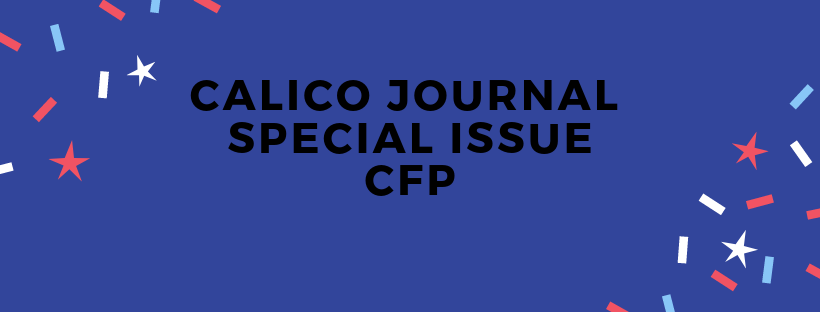
Co-editors: Carolyn Blume (TU Dortmund), Jules Buendgens-Kosten (Goethe University Frankfurt), Peter Schildhauer (Bielefeld University)
In theory, digitalization offers new opportunities to meet learners’ needs. This is especially true for those learners whose needs are considered atypical or who are at risk of educational exclusion due to marginalization or as a result of systemic barriers that interfere with participation. The potential role of computer-assisted language learning (CALL) is particularly important, given the centrality of digital media and mediatization to contemporary communication, language learning, and inclusion (Alper & Irons 2020; Blume & Bündgens-Kosten 2023; Reinhardt & Thorne 2017; Sauro & Zourou 2019). However, while an increasing number of conceptual proposals and practical recommendations address the potential of CALL to mediate inclusion, only a small proportion of these initiatives have been empirically assessed (Belda-Medina 2022; Kasch 2020; Ralston 2016). Advancements have been made since Hockly’s 2016 lament regarding the lack of “rigorous research studies” (p. 335), but analyses at the nexus of diversity and CALL – especially as regards disabilities beyond sensory and motor disabilities, and languages besides spoken English – remain rare. The available research, for example, regarding individual learner differences and CALL focuses primarily on universal factors contributing to learner heterogeneity in language learning, such as age, socioeconomic status, or aptitude (Dausend & Nickel 2017; Puebla et al. 2022). Other research that examines inclusive education via and with digital media generally does not consider additional or foreign language learning (e.g., Holz et al. 2023; Ikeshita-Yamazoe & Miyao 2014; Ringland 2019). As such, the growing research base does not, as yet, do justice to the complexity of diversity among disabled or marginalized language learners in CALL environments. This also applies to the complex, intersecting ways in which learners who may be seen as atypical or who are threatened by educational discrimination due to aspects of their identity are ill-served. This special issue seeks contributions that address these issues.
The role of digital media and tools stretches far beyond that of a potentially compensatory or additive element for inclusive language learning. Rather, digitalization can be understood as a process of mediatization, in which existing communicative practices and social processes are modified by new interactive means and forms (cf. Hepp 2020). The resulting culture of digitality (Stalder 2018) is marked by new forms of community building (cf. Jenkins 2009), (re-)mixing and sharing digital artifacts, as well as algorithmicity. Digital genres and semiotic modes used for creating meaning and forming identity are increasingly diversified. The New London Group’s (1996) call for a “pedagogy of multiliteracies” in response to these changes needs to be further examined in relation to its implications for a wide range of learners (cf. Schildhauer et al. 2020).
There are many ways that digital media, tools, and practices for language learning can accommodate learners who have physical or sensorial preferences, who are neurodivergent or who experience chronic illness. Some of these tools, applications, and activities are designed especially for specific groups of these learners, while others might achieve usefulness through universal design, similar accessibility-focused perspectives, or even incidentally. Hockly (2016) points to several studies that illustrate how “everyday technologies,” such as multimedia texts, voice recording apps, and individualized systems can support language learning for disabled English language learners in TESOL contexts. Such developments can theoretically lead to improved CALL for all, as a wider variety of individual needs among diverse learners drives didactic and technological advancement and adaptivity. However, much remains to be done.
This thematic issue seeks contributions that will contribute to our understanding of how digital tools and digital communication practices can facilitate inclusive language learning in different contexts. Possible topics include, but are not limited to:
Please send initial expressions of interest and/or queries to the following email addresses: carolyn.blume@tu-dortmund.de, buendgens-kosten@em.uni-frankfurt.de and peter.schildhauer@uni-bielefeld.de.
Timeline
May 15th, 2024: Initial expressions of interest/proposals of no more than 750 words. This proposal should address the theoretical framework employed, justification for the study, research questions, methodology, findings (where available), and implications for future research or pedagogy. For theoretical pieces, ensure the proposal includes a clearly articulated problem and a proposed solution.
August 30th, 2024: Invitation for full manuscripts of no more than 8,500 words including abstract and references (Please note that an invitation to submit a full-length manuscript does not guarantee publication in the special issue).
Dec. 1st, 2024: Full manuscript due to editors
Dec. 15th, 2024: Anonymized manuscripts sent to at least two external reviewers
March 1st, 2025: Round one peer review due to editors
June 1st, 2025: Revised drafts due to editors
August 15th, 2025: Final revised manuscripts due
February 2026: Special issue publication
References
Alper, M., & Irons, M. (2020). Digital socialising in children on the autism spectrum. In L. Green, D. Holloway, K. Stevenson, T. Leaver, & L. Haddon (Eds.), The Routledge companion to digital media and children (pp. 348–357). Routledge. https://doi.org/10.4324/9781351004107-33
Belda-Medina, J. (2022). Promoting inclusiveness, creativity and critical thinking through digital storytelling among EFL teacher candidates. International Journal of Inclusive Education, 26(2), 109–123. https://doi.org/10.1080/13603116.2021.2011440
Blume, C., & Bündgens-Kosten, J. (2023). The role of digitality for neurodivergent English language learners: Agency and well-being within and outside the ELT classroom.AAA: Arbeiten aus Anglistik und Amerikanistik/Agenda: Advancing Anglophone Studies, 48(2), 211–235. https://doi.org/10.24053/AAA-2023-0012
Dausend, H. & Nickel, S. (2017). Tap’n’Talk – Differenzierte Förderung von Sprachproduktionen durch tabletgestützte Lernaufgaben. In S. Chilla & K. Vogt (Eds.), Heterogenität und Diversität im Englischunterricht. Fachdidaktische Perspektiven (pp. 179-203). Peter Lang.
Hepp, A. (2020). Deep mediatization. Routledge.
Hockly, N. (2016). Special educational needs and technology in language learning. ELT Journal, 70(3), 332–338. https://doi.org/10.1093/elt/ccw033
Holz, H., Ninaus, M., Schwerter, J., Parrisius, C., Beuttler, B., Brandelik, K., & Meurers, D. (2023). A digital game-based training improves spelling in German primary school children: A randomized controlled field trial. Learning and Instruction, 87, 101771. https://doi.org/10.1016/j.learninstruc.2023.101771
Ikeshita-Yamazoe, H., & Miyao, M. (2014). A visual training tool for teaching kanji to children with developmental dyslexia. Computer Assisted Language Learning, 29(1), 88–102. https://doi.org/10.1080/09588221.2014.889716
Jenkins, H. (2009). Confronting the challenges of participatory culture: Media education for the 21st century. The MIT Press.
Kasch, H. (2020). Innovative inclusive educational technology in language classrooms and learner perspectives: A study of nine learner narratives. In A. L. Brooks, E. I. Brooks, O. Akan, P. Bellavista, J. Cao, G. Coulson, F. Dressler, D. Ferrari, M. Gerla, H. Kobayashi, S. Palazzo, S. Sahni, X. (S.) Shen, M. Stan, X. Jia, & A. Y. Zomaya (Eds.), 8th EAI International Conference, ArtsIT 2019, and 4th EAI International Conference, DLI 2019, Aalborg, Denmark, November 6–8, 2019, Proceedings (pp. 660–670). Springer International Publishing. https://doi.org/10.1007/978-3-030-53294-9_50
New London Group. (1996). A pedagogy of multiliteracies: Designing social futures. Harvard Educational Review, 66(1), 60–93.
Puebla, C., Fievet, T., Tsopanidi, M., & Clahsen, H. (2022). Mobile-assisted language learning in older adults: Chances and challenges. ReCALL, 34(2), 169-184. https://doi.org/10.1017/S0958344021000276
Ralston, K. K. (2016). Autism and English in Iceland: Are young Icelanders with autism spectrum disorders using English differently than their peers? [MA Thesis]. Háskóli Íslands, Iceland. https://skemman.is/bitstream/1946/25931/1/MA%20ritger%c3%b0%20complete.pdf
Reinhardt, J., & Thorne, S. L. (2017). Language socialization in digital contexts. In P. A. Duff & S. May (Eds.), Language socialization: Encyclopedia of language and education (pp. 1–13). Springer International Publishing. https://doi.org/10.1007/978-3-319-02327-4_27-1
Ringland, K. E. (2019). “Autsome”: Fostering an autistic identity in an online Minecraft community for youth with autism. In N. G. Taylor, C. Christian-Lamb, M. H. Martin, & B. Nardi (Eds.), Information in contemporary society (pp. 132–146). Springer International Publishing.
Sauro, S., & Zourou, K. (2019). What are the digital wilds? Language Learning & Technology, 23(1), 1–7.
Schildhauer, P., Sauer, J., & Schröder, A. (2020). Standards – margins – new horizons: Editorial. PraxisForschungLehrer*innenBildung. Zeitschrift für Schul- und Professionsentwicklung. (PFLB), 2(4), V-XII. https://doi.org/10.4119/pflb-3534
Stalder, F. (2018). The digital condition (V. A. Pakis, Trans.). Polity Press.
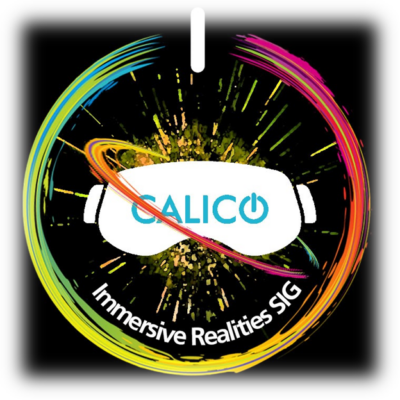
Registration: https://forms.gle/waoScGYPHaWYJbgg9
When: October 27, 2023. 5:00 to 6:00 pm US Eastern time.
Where:https://purdue-edu.zoom.us/j/96671836504?pwd=c21sVm5xZERnWTlQTjVIeEVjWjZpUT09
Passcode: 119072
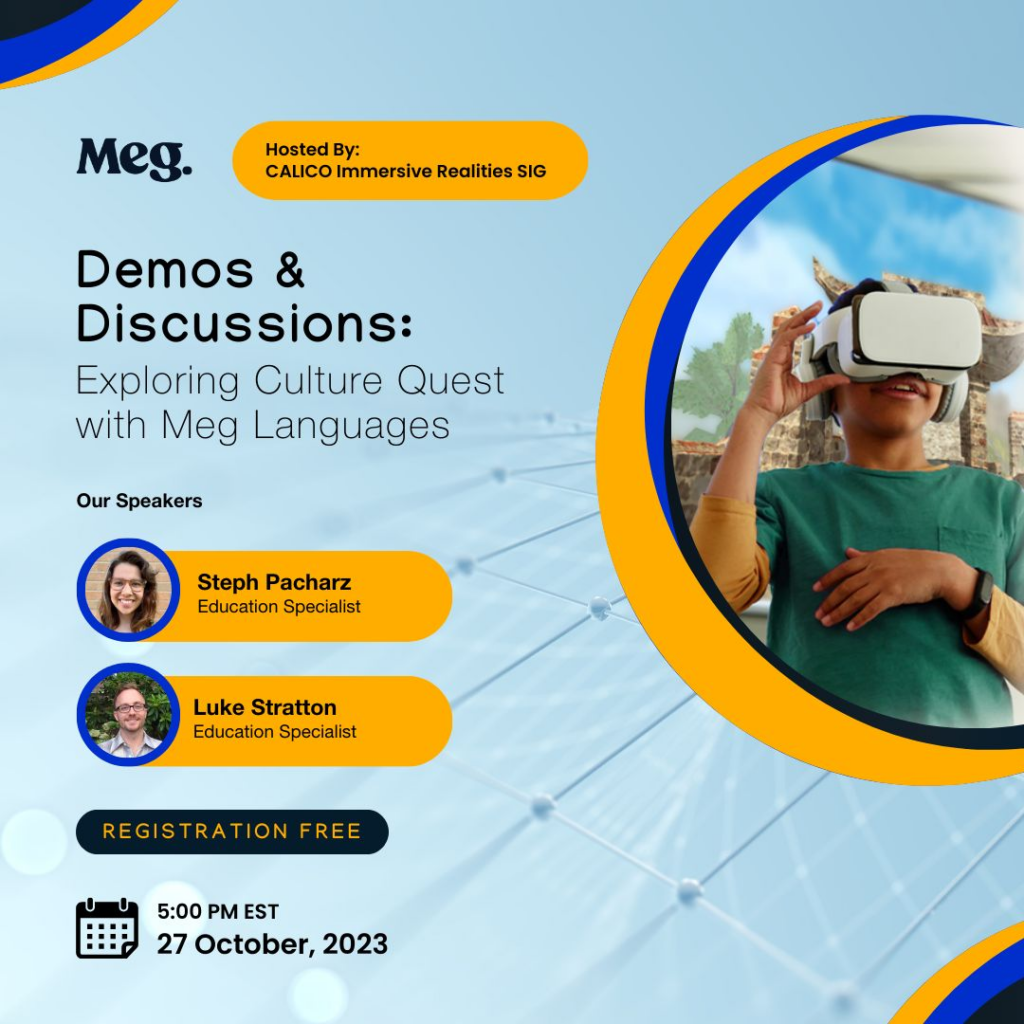

The editors of the CALICO Journal are recruiting a Learning Technology Reviews (LTR) Editor. The LTR editor will be responsible for soliciting reviews of language learning courseware, tutorial apps, and online resource websites and will work closely with authors in bringing the reviews to publishable quality. The LTR editor will also use the journal’s online management system to manage these manuscripts through all stages of the publishing process. This is an unpaid position and requires a two-year commitment.
The CALICO Journal publishes an average of six LTRs per volume (two per issue) and uses the framework and format described in Hubbard (2019). Generally speaking, reviews may be no more than 3,000 words (including all text, references, entire review, and bio statement) and contain no more than 4 figures or images. Examples of recently published LTRs can be found here.
For immediate consideration, please send your CV and a short expression of interest to both of the CALICO Journal editors by October 31st:
Bryan Smith bryansmith@asu.edu and Ana Oskoz oscoz@umbc.edu
Hubbard, P. (2019). Evaluation of courseware/tutorial apps and online resource websites.
In N. Arnold & L. Ducate (Eds.) Engaging Language Learners through CALL (pp. 390–430). Sheffield, UK: Equinox.
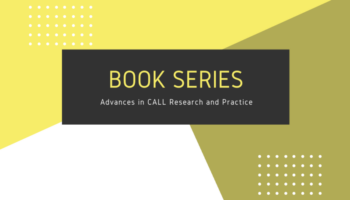
CALICO is now soliciting proposals for the next volume in the Advances in CALL Research and Practice book series to be published in Spring 2026. The volume may be a single-authored monograph or edited volume and may treat any topic related to the field of CALL.
Proposals should include the following information:
Proposals should be submitted as a Word document to steph.link@okstate.edu no later than September 15, 2023. Final chapters must be submitted to Equinox no later than August 30, 2025.
You can find more information about the series here: https://www.equinoxpub.com/home/advances-call-research-practice/
The 2026 volume will be the tenth book in the new series. Previous volumes include:
2016 Landmarks in CALL Research, Edited by Greg Kessler
2017 Learner Autonomy and Web 2.0, Edited by Tim Lewis, Annick Rivens Mompean, and Marco Cappellini
2018 Assessment Across Online Language Education, Edited by Stephanie Link and Jinrong Li
2019 Engaging Language Learners through CALL, Edited by Nike Arnold and Lara Ducate
2020 Understanding Attitude in intercultural virtual communication, Edited by Ana Oskoz and Marga Vinagre
2021 Project-Based Language Learning and CALL: From Virtual Exchange to Social Justice, Edited by Michael Thomas and Kasumi Yamazaki
2022 Identity, Multilingualism and CALL, Edited by Liudmila Klimanova
2024 Crisis Response to Language Teaching Edited by Senta Goerter and Jesse Gleason
2025 Advancing Critical CALL Across Institutions and Borders Edited by Emma Britton, Angelika Kraemer, Theresa Austin, Hengyi Liu, and Xinyue Zuo
Recent volumes in the previous CALICO Monograph series include:
2010 CALL in Limited Technology Contexts, ed. Joy Egbert
2011 Present and Future Promises of CALL (2nd edition of 2006), eds. Nike Arnold and Lara Ducate
2012 Technology Across Writing Contexts and Tasks, eds. Greg Kessler, Ana Oskoz, and Idoia Elola
2013 Design-Based Research in CALL, eds. Julio Rodríguez and Cristina Pardo-Ballester
2014 Digital Literacies in Foreign and Second Language Education, eds. Janel Pettes Guikema and Lawrence Williams
2015 Researching Language Learner Interaction Online: From Social Media to MOOCs, eds. Ed Dixon and Michael Thomas

Published: 2023-05-25

Fall 2022
Issue 44:
Jakob Johnson (Chair)
Daniel Dixon (Associate Chair)
Greetings!!
Hope you all had a good Thanksgiving!
New Discord Server and Methods to Interact and Keep in Touch
Remember that we have a Facebook group and a Google Group; the join link can be found on the SIG’s page on CALICO’s website.
Based on comments during CALICO 2022 we decided to also create/move to a Discord server (invite link here: https://discord.gg/nVeZw8JqHq). Our hope in creating this is to help encourage collaboration and interaction as it seems the google group and Facebook group do not see much traffic. However, please let us know what you think of the move to Discord. Thank you to those who have joined!
We will continue to use Google Groups for the Newsletter, as well as posting and archive of Newsletters to Discord.
One of the aspects of using Discord was a hope for the ability to archive past newsletters which has been done (at least a link to a google drive folder) for easy access. We also discussed potentially creating some form of list of games people like to use in their classrooms with potential short explanations of how to use them while teaching.
Here is the Google Forms link: https://forms.gle/KciuZuDxmf8C7XVH8
Examples of Using Games:
Newcomer: A Language Learning RPG
In this issue, we spoke with Jason Kappes, a software engineer who is solo developing Newcomer, a fantasy language learning video game. In the game, players learn a second language to save the kingdom and befriend its people. We asked Jason to tell us a little bit about the game and what inspired him to create it.
In Newcomer, players have the ability to participate in second language conversations. Players can communicate, create relationships, and complete conversation goals with more than 100 characters. These conversations and relationships can lead to the player receiving a quest, an item, or access to a new area. You can watch an example of this character interaction with this link:
https://www.youtube.com/watch?v=LQ2DA-mhfqs
During in-game conversations, players build sentences and based on what is said, the NPC (interlocutor) will respond accordingly. NPCs can understand context, respond intelligently, and ask the player questions. The amount the player can say is constrained to their progress in the game.
In addition to L2 conversations, there are translatable short stories, grammar guides, a multi-modal dialogue system, and language battles. I also added simple RPG mechanics such as fishing, mining, crafting, alchemy, questing, and exploration.
The languages offered in the base application will be English, Spanish, Italian, and French. A user will choose their native language and then the second language to learn. Spanish natives can learn English, English natives can learn French, etc. Newcomer was created for absolute beginner – intermediate learners. The goal is that an absolute beginner can complete the game and be able to have basic conversations using elementary vocabulary, from A0 – A1.
My personal journey: Language learning is a hobby, but I wanted (and think there should be) a more interesting context to learn within. I thought language learning would work well in a Pokemon-esque video game where there are clear in-game goals tied to language progression. I’m also interested in creating game-based learning applications, so creating Newcomer is the intersection of my hobby (language learning), passion (programming), and meaning (making it easier to learn languages, and improve the world). I’m not an expert, and I am still growing as a programmer, language learner, and language educator. I’m reading research papers, discussing what I’m making with like-minded individuals, and actively creating and iterating on digital game-based language learning methods. My favorite book has been The Routledge Handbook of Second Language Acquisition and Technology. A special shoutout goes to LLP (Ludic
Language pedagogy) who have helped me along my journey. While I don’t declare Newcomer is a silver bullet to learning languages, it has research-based methods baked within that will help language learners improve.
The full trailer and more project features can be viewed on my Kickstarter:
https://www.kickstarter.com/projects/jasonkappes/newcomer-language-learning-rpg
Feel free to share with friends and colleagues that are interested. If anyone wants to know more about Newcomer, or potentially work on interesting DGBLL projects in the future, contact me at jasonkappes656@gmail.com.
Recent Publications
Reed, J. (2022). “This class doesn’t have a textbook?”: An overview of a TRPG course for L2 English learners in Japan. Ludic Language Pedagogy, 4, 53–70. https://llpjournal.org/2022/09/06/reed-trpg-walkthrough.html
Sorry I wasn’t aware of any others (please reach out though if you have any, and we can get them put on the Discord)
Virtual October Get Together
So we didn’t have a great turn-out, if people are interested in doing something before the CALICO conference let us know on the Discord! We would be happy to plan another virtual get together some time next semester.
Upcoming Conferences
Below is a listing of some upcoming conferences which you may be interested in attending and/or presenting at. If there are any conferences that you feel should be added to this list, let us know! (We are particularly interested in any game-related or CALL-related conferences) Remember that for some conferences, you need to submit proposals far in advance, so keep that in mind as you prepare to share your classroom practice and research about using games for language learning.
Multiple Dates, 2023-2024
Jun 6-10th, 2023 June 14-17, 2023 June 25-28, 2023
June 26-29, 2023
July 23-26th, 2023
2023
Sept 6-8th, 2023
Sept 16-17th, 2023
Oct 2-5, 2023
ICGGBL
International Conference on Gamification & Serious Game
Submissions Closed for 2023
CALICO
Submissions Closed
IALLT Conference
International Association for Language Learning Technology
ISTE Edtech Conference
International Society for Technology in Education
Submission Closed
AATSP Conference
American Association of Teachers of Spanish & Portuguese
Submissions Closed
AATF Convention
American Association of Teachers of French
Submissions Open Sept 1st – Dec 15th 2022
EUROCALL Conference
European Association of Computer Assisted Language Learning
Pronunciation in Second Language Learning and Teaching Conference
ICALT Conference
IEEE International Conference on Advanced Learning Technologies
Submissions Closed
WorldCALL Conference
Seoul, London, Singapore, Washington
Minneapolis, Minnesota
New Orleans, Louisiana
Philadelphia, PA
Salamanca, Spain
Trois-Rivières, Québec
Reykjavik, Iceland
West Lafayette, IN
Amsterdam, Netherlands
Kazan, Russia (No longer taking place in Kazan, but new location not on website)
TBA SeriousPlay ? Submissions Rolling, but selection starts in OCT
(https://www.seriousplayconf.com/speaker-submission/)
The GSIG Newsletter is a quarterly newsletter for the Gaming SIG, a special interest group of the Computer Assisted Language Instruction Consortium (CALICO).

Papers are invited for a special issue of CALICO, the journal of the Computer-Assisted Language Instruction Consortium, on ‘Technology-Mediated Task-based Language Teaching and Learning. We are pleased to invite proposals for the special issue of volume 42 of the CALICO Journal, which will be published in February 2024. With this call for proposals, we are looking for (a) guest editor(s), who will produce an issue on a timely and compelling CALL-related theme that will resonate with our readership and move the field forward. If you are interested in becoming a guest editor, please submit a proposal addressing the following points:
(1) name(s) and affiliation(s) of the guest editor(s)
(2) topic of the special issue
(3) rationale for the topic (500 words maximum)
(4) short CV of each guest editor (with particular emphasis on published research on the topic of the special issue and editing experience)
(5) draft Call for Papers for the special issue
The editors invite papers exploring innovative approaches to designing, implementing, and evaluating technology-mediated task-based language teaching and learning. Papers may report on empirical studies or theoretical pieces that challenge our current thinking about TBLT. Quantitative, qualitative, mixed-, and multiple-method designs are
welcome. Quantitative studies examining learner process data are especially welcome as are all designs targeting less commonly taught languages, including ASL and other sign languages of the world. Studies relying purely on survey or questionnaire research will not be considered. Full-length manuscripts of no more than 7,500 words (all inclusive) will be invited by the editors after evaluating expressions of interest (see timeline below).
As a starting point, we use González-Lloret and Ortega (2014) in our framing of the five definitional features of a task in the context of technology and task integration. These features include the following: 1. Primary focus on meaning; 2. Goal orientation; 3. Learner-centeredness; 4. Holism; and 5. Reflective Learning. We also assume the non-neutrality of technology and acknowledge the importance of curriculum in task-technology integrations. Forward-thinking topics relevant to technology-mediated task-based language teaching and learning may include but are not limited to:
| AI in TMTBLT Assessment Critical approaches to TMTBLT Curriculum Design Digital literacies Extramural language learning Gaming Individual differences Materials development Methodological considerations Mobile environments |
Needs analysis Online, hybrid or blended course design Replication studies Special needs language learners Task complexity Task design Task sequencing Tasks in multisensorial environments The role of the teacher Theoretical constructs in TMTBLT Young learners |
Initial expressions of interest and informal inquiries are encouraged and should be sent to the editors, Ana Oskoz oscoz@umbc.edu and Bryan Smith bryansmith@asu.edu. All proposals will be evaluated by the CALICO Journal’s editorial board. Please see the complete timeline below.
Initial expressions of interest/proposals of no more than 750 words are due by October 10, 2023. This proposal should address the theoretical framework employed, justification for the study, research questions, methodology, findings (where available), and
implications for future research or pedagogy. For theoretical pieces, ensure the proposal includes a clearly articulated problem and a proposed solution.
Timeline:
• 10 October 2023: Initial expressions of interest/proposals
• 1 December 2023: Invitation for full manuscripts
• 1 June 2024: Full manuscript due to editors
• 15 June 2024: double-blind review process
• 1 August 2024: Round one peer review due to editors
• 1 November 2024: Revised drafts due to editors
• 28 February, 2025: Final revised manuscripts due
• 2025: Special Issue Publication
Please note that abstract acceptance does not guarantee publication of the submitted manuscript. All manuscripts will be subject to a double-blind peer review process.